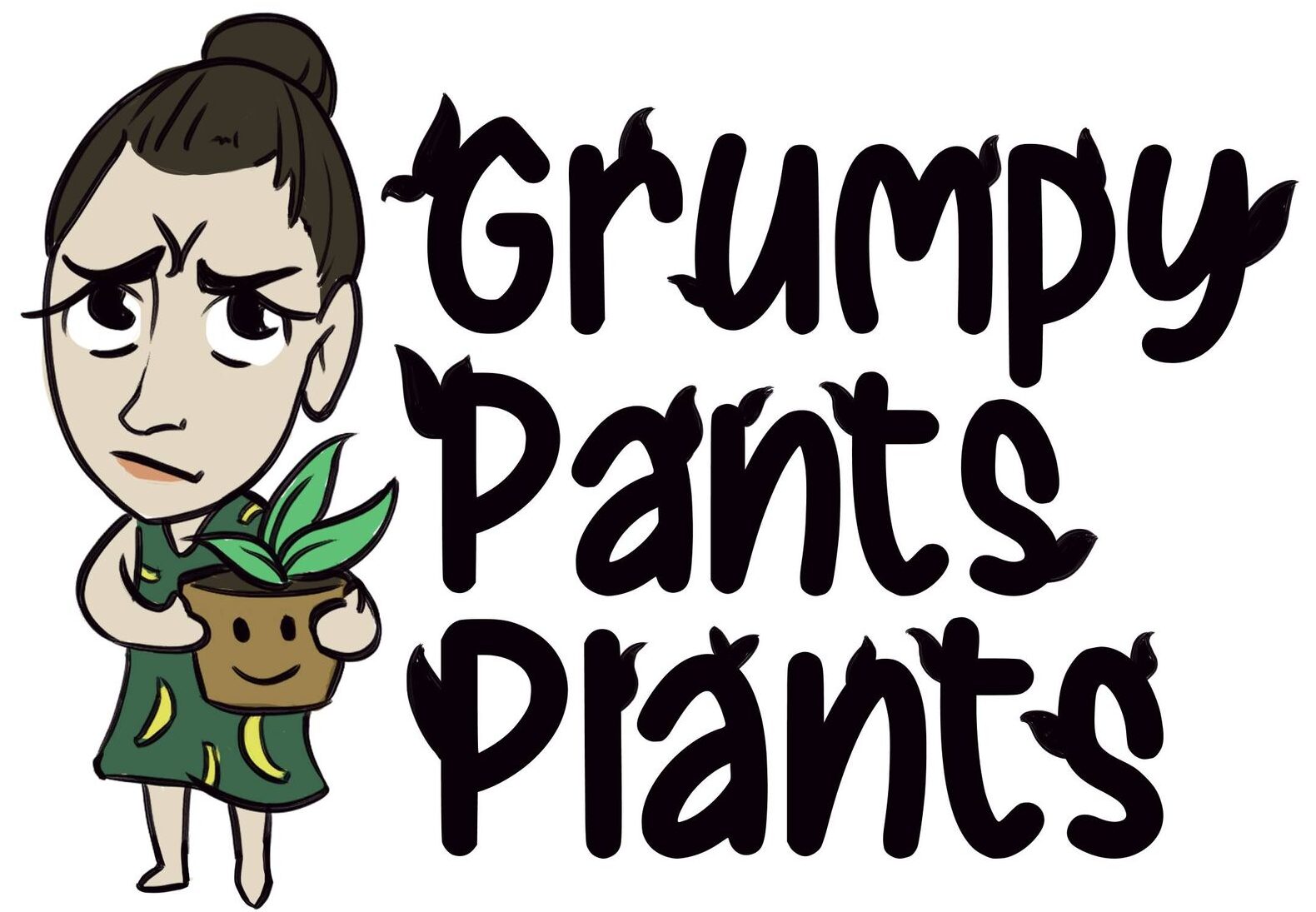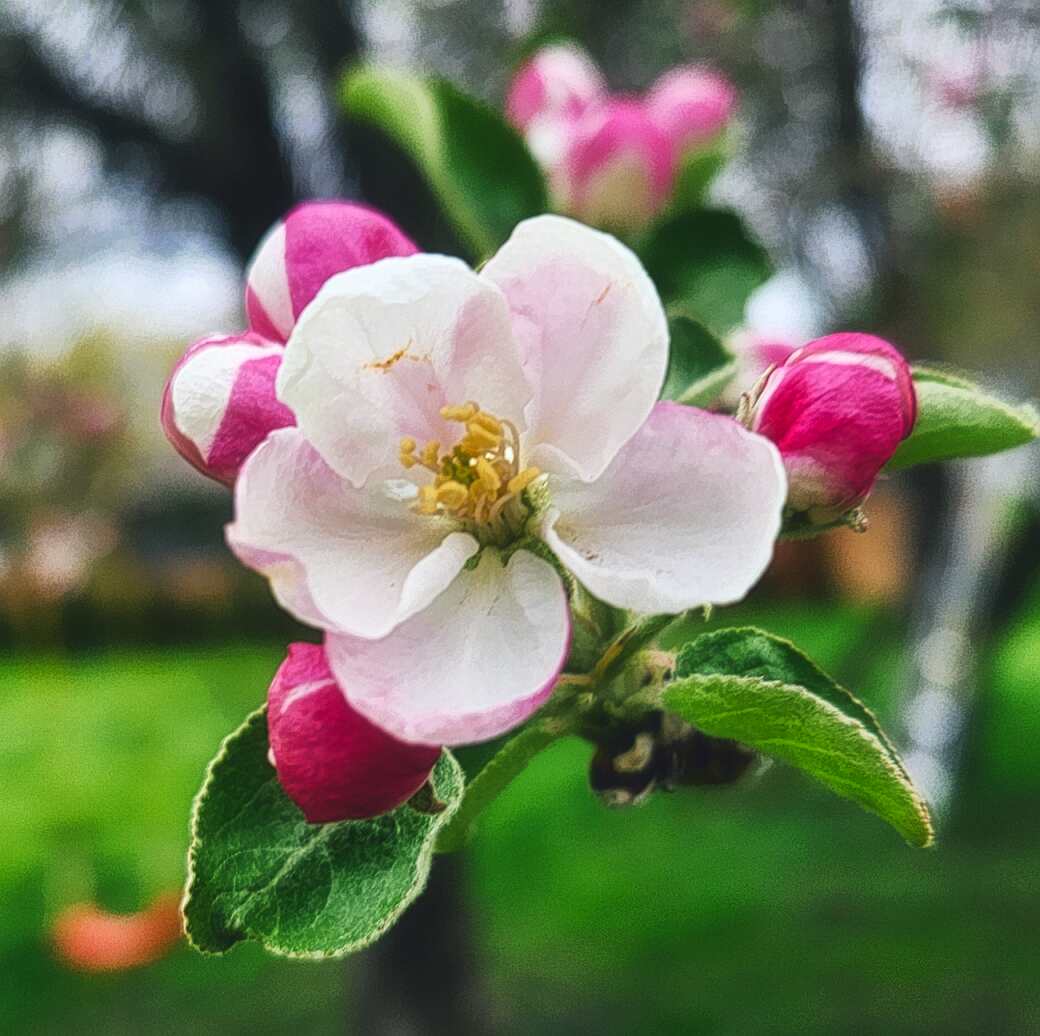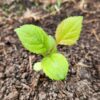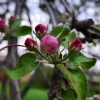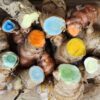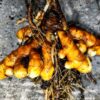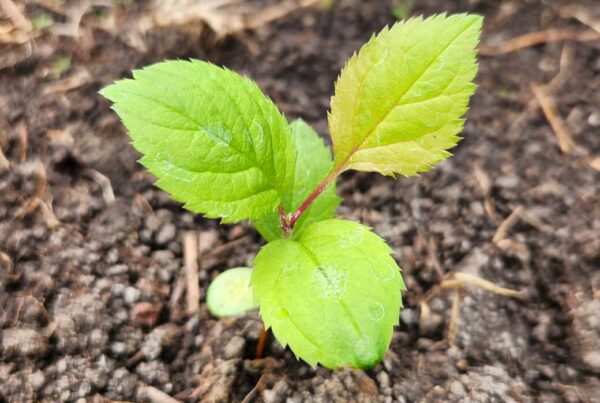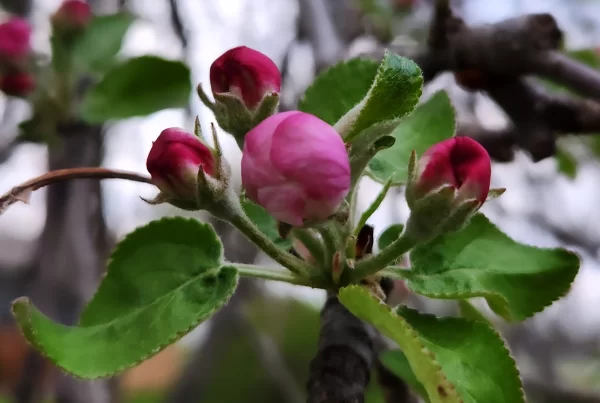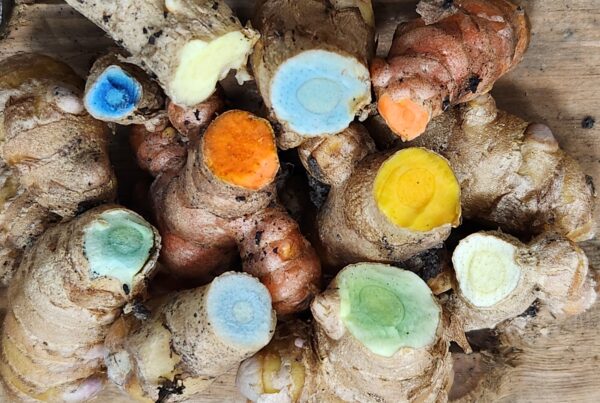Below are varieties that we are currently growing in our heirloom apple orchard. Unless otherwise noted, these are young grafted trees that we hope will produce marketable fruit within the next 4-5 years. Most are heirloom varieties, although a few are current favorites. As of 2025, some are experimental varieties from Steven Edholm of Skillcult. This page will be frequently updated, with new information and photos as we have them.
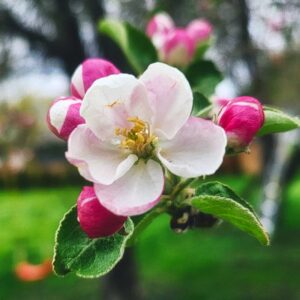
Alatau
Limited information is available about this apple. Scion was sourced from Hocking Hills Orchard. It was simply described as a red-fleshed apple from Kazakhstan. Alatau appears to be a vigorous grower thus far.
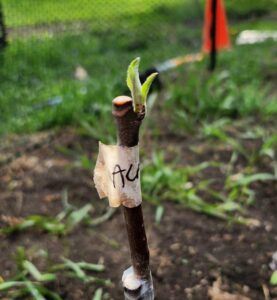
Ashmead’s Kernel
Origin: Gloucester, England, early 1700’s
Color: orange/gold/green/russet skin with yellow flesh
Flavor: intensely sharp and sweet
Best for: fresh eating
Bill’s Red Flesh
Origin: Oregon, 2000’s?
Scion was sourced from Hocking Hills Orchard. Originally introduced by Bill Schultz of Oregon. Described as having deep pink blossoms in the spring and reddish foliage in the summer. Apples described as red-skinned with bright red flesh that is flavorful and sweet.
Black Strawberry
Origin: California, 2020
Note black strawberry is an experimental release from the breeder Skillcult.
A red-fleshed Skillcult introduction, likely a Grenadine x King David cross. I’m doubtful it will ripen early enough here in zone 4b/5a, but its promise of strawberry flavor made me curious enough to graft a couple. This apple may wind up in a greenhouse if it late ripening is its only drawback.
Cherry Crush
Origin: California, 2021
Note cherry crush is an experimental release from the breeder Skillcult.
A pink-fleshed Skillcult introduction, a Grenadine x Cherry Cox cross. It is said to ripen in the early fall and have a hint of cherry flavor. I am hopeful this apple will do well in this climate given it’s early fall ripening and due to having cherry cox as a parent. This apple wants to grow; my cherry crush grafts had green leaves emerging a mere THREE days after grafting. They continue in their vigorous growth after transplanting outdoors.
Cornish Gilliflower
Origin: England, 1700’s
Color: green with red streaks and covered with russeting
Flavor: clove-like, highly flavored and aromatic, perhaps hits of honey or melon
Best for: fresh eating, cooking
Cornish gilliflower has the largest buds of any scion I’ve grafted. Growth seems vigorous so far, although I’ve read it prefers more moderate climates than mine. It may get a greenhouse space at some point if this is true.
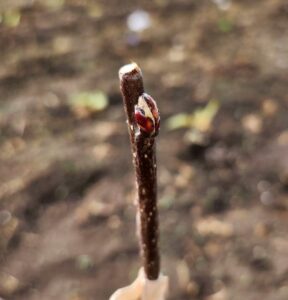
Cox’s Orange Cherry
Origin: England
Color: a redder sport of cox’s orange pippin
Flavor: cherry-like, less complex than its parent cox’s orange pippin (below)
Best for: fresh eating
Cox’s Orange Pippin
Origin: Bucks, England, 1825
Color: orange/red mottled over yellow skin, yellow flesh
Flavor: highly flavored, complex flavor with subtle notes that range from citrus to pear to tropical flavors
Best for: fresh eating, storage, some argue it is one of the very best dessert apples
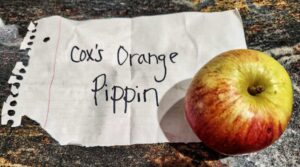
Egremont Russet
Origin: England, 1800’s
Color: Green with russeting
Flavor: Rich, balanced sweet/tart, some describe it as nutty
Best for: Fresh eating, some say it makes THE best apple juice
Of note, I purchased several pounds of egremont russet apples this past fall and they disappeared quite quickly from my kitchen. The entire family loved them and I was quite sad when they were gone. I decided I needed to graft my own this year!
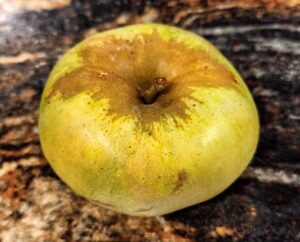
Fireside
Origin: Minnesota, 1940’s
Color: Greenish yellow with red striping
Flavor: I think it tastes like apple candy. Sweet, with tart undertones.
Best for: Fresh eating, makes great applesauce
Note: Note: our Fireside (picture below) has been confirmed correct by DNA testing through Washington State University.
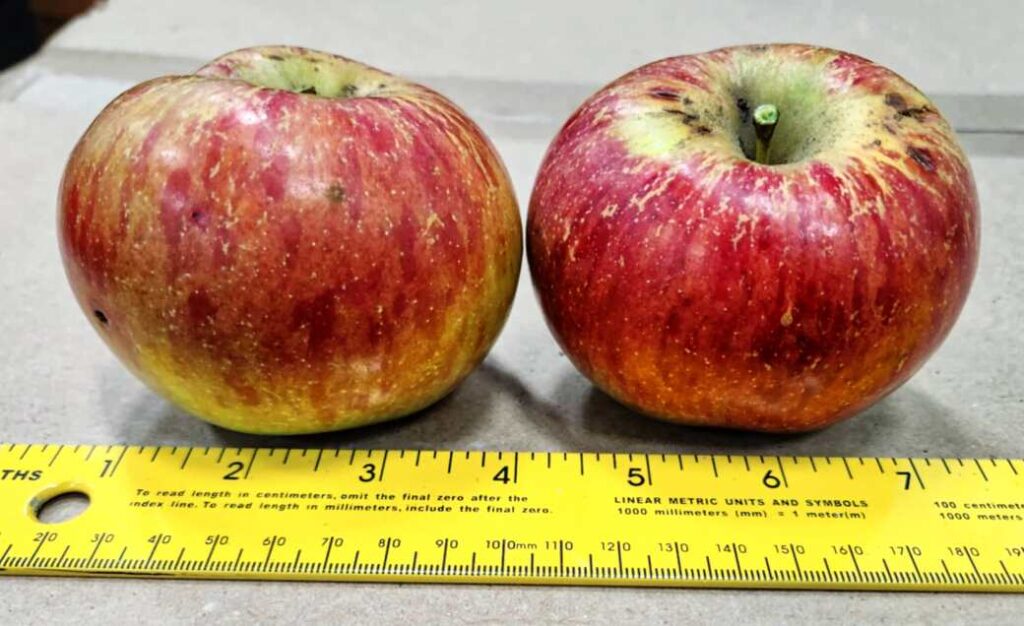
Freedom
Origin: New York, 1958
Color: Yellow with bright red striping
Flavor: Balanced sweet/tart, some consider it to have a “spicy” flavor
Best for: Fresh eating, cooking, cider
This tree was named freedom due to its disease resistance. I am trying to balance easy-care trees with some old heirlooms at our acreage.
Frostbite
Origin: Minnesota, released in 2008
Color: Deep red over a gold backdrop
Flavor: Intensely sweet and tangy. It is said that people either love or hate this apple, and that taste descriptions range from sugarcane to olives. I’ll add my opinion here as soon as I taste one; my tree has just flowered, so perhaps that will be this fall!
Best for: Fresh eating, cider, breeding other apples (the University of Minnesota has used it for breeding since the 1920’s; it’s a grandparent of the popular honeycrisp apple)
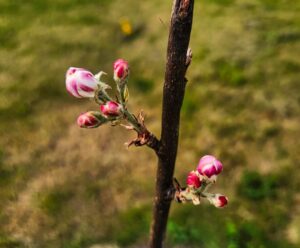
Golden Russet
Origin: New England, likely before 1800
Color: Green background mostly covered in russet
Flavor: Richly delicious, good sweet/tart balance
Best for: Fresh eating, drying, cider
This is the apple that started my curiosity about heirloom varieties. Golden Russet was Mr. Grumpy Pants’ favorite apple at the SSE tasting event.
Gray Pearmain
Origin: Maine, 1800’s
Color: Greenish yellow with pink blush
Flavor: Described as pear-like and delicious
Best for: Fresh eating, juicing
Green Newtown Pippin
Origin: New York, 1700’s
Color: Solid light green
Flavor: Tart, described as “outstanding” in Bussey’s The Illustrated History of Apples in the United States and Canada
Best for: fresh eating
Described by Hocking Hill’s orchard as having distinctive “corkscrew” branches; I’m excited to see how these grafts grow. Not the same as Newtown Pippin (which is what comes up when you do an internet search for “green newtown pippin”), and apparently was thought to be extinct until recently.
Hamilton
Origin: Southern US in the early to middle 1800’s.
Color: Yellow skin covered with red blushing and/or striping, yellow flesh
Flavor: Sweet, compelling
Best for: fresh eating, cooking
I grafted this apple prior to visiting the SSE orchard this past fall and was thrilled at how much I liked its taste. Despite having tried many apples already that day, I ate more than one Hamilton because I found them so tasty.
Honeycrisp
Origin: developed by the Minnesota Agricultural Experiment Station’s Horticultural Research Center of the University of Minnesota in 1960, cross of Honeygold and Macoun apples, introduced to the public in 1991
Color: yellow skin with red/orange blushing
Flavor: sweet
Best for: fresh eating
Honeygold
Origin: developed by the Minnesota Agricultural Experiment Station’s Horticultural Research Center of the University of Minnesota in the early 1900’s, cross of Golden Delicious and Haralson apples, introduced to the public in 1970
Color: golden yellow skin that may have red blushing, with yellowish-white flesh
Flavor: sweet, sweeter than Golden delicious
Best for: fresh eating
Kavanaugh
Origin: Maine, late 1700’s
Color: Russet over bright green
Flavor: mild and somewhat tart
Best for: applesauce; the skins are said to dissolve within a couple minutes of boiling, making easy sauce
King David
Origin: Arkansas, 1893
Color: green skin overlaid with deep red, yellow flesh
Flavor: intensely tart, notes of spices, citrus, and/or tropical flavors
Best for: fresh eating, cooking, pies, storage
Liberty
Origin: developed by the New York State Agricultural Experiment Station and released to the public in 1978.
Color: yellow skin with red overtones, white flesh
Flavor: sweet-tart
Best for: fresh eating, cooking
Despite being left unprotected and ravaged by deer, then transplanted this past winter, this apple has rebounded well and continues its vigorous growth. Liberty is a modern disease-resistant cultivar and so far I’m impressed by its resilience.
Maiden Blush
Origin: New Jersey, late 1700’s
Color: light yellow skin with red blush, white flesh
Flavor: tart
Best for: cooking, juicing
Mann
Origin: New York, 1850
Color: Yellow skin, yellow flesh
Flavor: subacid
Best for: cooking
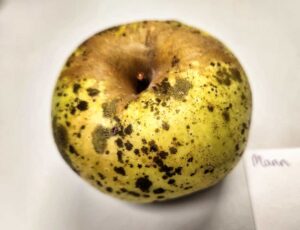
McIntosh
Origin: 1800’s, Ontario, Canada
Color: deep red over yellow
Flavor: Balanced subacid, spicy, with subtle fruit punch flavors
Best for: Fresh eating, applesauce
Note: our McIntosh (picture below) has been confirmed correct by DNA testing through Washington State University.
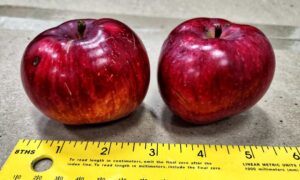
Musketeer
Origin: California, 2024
Note musketeer is an experimental release from the breeder Skillcult.
A Skillcult introduction, a Rubaiyat and Pink Parfait cross. I’m unsure if it will enjoy winters in zone 4b/5a, but its musky and melon-like flavor made me curious enough to graft one. It is said to ripen late August to early September in California, which would work here. Despite its parents, it doesn’t have any red flesh.
Northwest Greening
Origin: 1800’s, Wisconsin
Color: pale green
Flavor: sweet with a delicious, complex tropical flavor with a slight tart note.
Best for: Fresh eating, cooking
One of my top 3 apples from the SSE tasting. I’ve seen much less favorable reviews on it by others; perhaps its quality differs greatly with differing growing conditions.
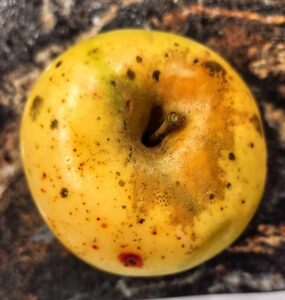
Pinker Lady
Origin: California, 2025
Note pinker lady is an experimental release from the breeder Skillcult.
A Skillcult introduction, a Rubaiyat and Cripp’s Pink (aka Pink Lady™) cross. Said to have a hint of strawberry flavor with pink skin and mottled pink flesh. This apple seems quite vigorous; these grafts were some of the first to fully leaf out after transplanting outdoors.
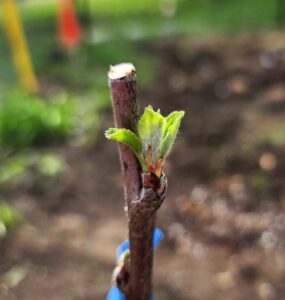
Pink Pearl
Origin: California, 1944
Color: yellow skin with red undertones (from pink flesh)
Flavor: tart with notes of rose
Best for: fresh eating, pink applesauce, cooking
An Albert Etter introduction.
Starkey
Origin: Maine, 1800’s
Color: yellow skin with red blushing
Flavor: complex honey-like taste, balanced sweet/tart
Best for: fresh eating, storage
John Bunker’s Book Apples and the Art of Detection made me curious about this apple. May be partially self-fertile, so may be a better pollen parent than apple parent in breeding.
Sweet 16
Origin: Minnesota, 1977
Color: red blush and striping
Flavor: balanced sweet/tart with candy-like flavors, some describe it as the best-flavored modern apple introduction
Best for: fresh eating
Tolman Sweet
Origin: Massachusetts, 1700’s
Color: yellow-green skin, white flesh
Flavor: sweet
Best for: juice, pies, fresh eating
Vanilla Pink
Origin: California, 2024
Note vanilla pink is an experimental release from the breeder Skillcult.
A pink-fleshed Skillcult introduction, a grenadine and gold rush cross. I’m unsure if it will ripen fully in zone 4b/5a, but its neon pink flesh and vanilla candy flavor made me curious enough to graft a couple. It may end up in a greenhouse if late ripening is its only issue here.
Whitney Crab
Origin: Illinois, 1800’s
Color: yellow with red stripes
Flavor: subacid with some crab apple flavor
Best for: cooking
Windfall Golden
Origin: Vermont, date unknown
Color: golden yellow with some russet
Flavor: exceptionally sweet and crisp. complex flavor- tropical with banana notes, and somewhat creamy, like candy or sorbet. one of my absolute favorite dessert apples
Best for: fresh eating
This apple was easily in my top three favorites from my SSE apple tasting experience. Scion sourced from SSE.
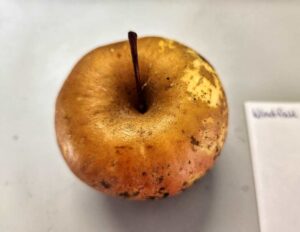
Wolf River
Origin: Wisconsin, 1860’s
Color: green-yellow skin with red stripes and blushing,
Flavor: subacid
Best for: cooking, baking, applesauce
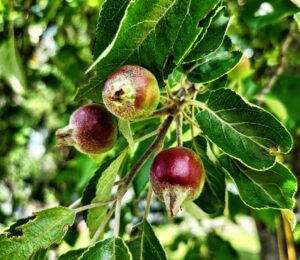
In case you can’t tell, we love old apples! Have any on your land? We love new apples too. Are you growing any experimental varieties? We’d love to hear your apple stories and swap scion wood. Feel free to comment below, contact us on our homepage, or drop a note at our roadside stand!
Have an old favorite you’d like to save? If you’re local, we’d be happy to show you how to graft your own tree, or to graft one for you. If you’re not in the area, we recommend the Seed Savers Exchange’s online apple grafting classes, offered each spring. We also recommend taking a visit to Seed Savers heirloom orchards to try their historic apples.
Want to learn about some of our other adventures? Check out our recent experiments with plastic eating mushrooms.
